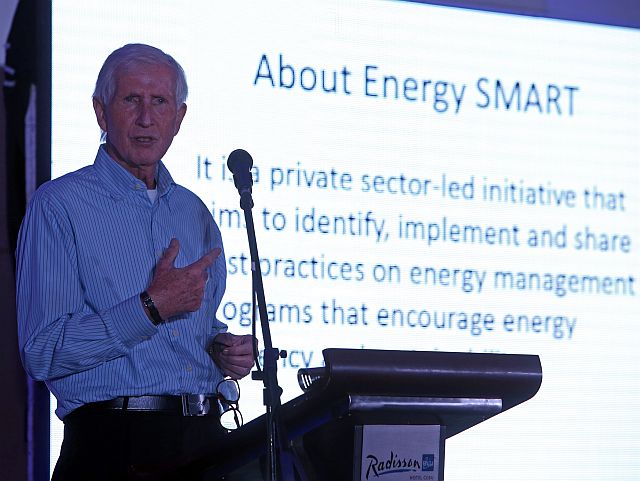
Henry Schumacher, European Chamber of Commerce of the Philippines (ECCP) senior advocacy advisor, discusses plans and investments of the European Union in the Philippines during the 2016 Energy Smart Visayas forum at the Radisson Blu Hotel Cebu.
(CDN PHOTO/LITO TECSON)
A European Chamber of Commerce of the Philippines (ECCP) official said he was hoping that 190 million euros or at least P10 billion of promised investments by the European Union (EU) for renewable energy and rural electrification projects in the country would also benefit the Visayas.
Henry Schumacher, ECCP senior advocacy advisor, said that while the ECCP had no control over where or how the money would be spent, he was hoping that the Visayas would get a major share of this investment.
Schumacher cited the EU’s commitment announced last Friday of investing 60 million euros to help Filipinos gain access to renewable energy and for the rural electrification projects with 130 million euros more to follow.
The pledges from EU were announced in another energy forum in Manila last Friday and would be worth P10.16 billion based on current foreign exchange rates.
Citing the Philippine electrification profile presented by the Department of Energy (DOE) in a recent forum, Schumacher said only 79 percent of households in the Visayas and 56 percent in Mindanao against 89 percent in Luzon had access to electricity.
“If we are taking the new administration’s aim of decentralization and regionalization seriously, then it has to go to the Visayas and Mindanao to quite an extent,” said Schumacher at the sidelines of the 2016 Energy Smart Visayas forum at Radisson Blu Hotel in Cebu City on Thursday.
By 2030, the Department of Energy in the forum last Friday also aimed to energize 100 percent of households in the Philippines and sought to have three times the number of renewable energy sources that the country has today.
Schumacher said that EU had not changed its perspective despite the insults Duterte had thrown at them in the last few weeks.
“The commitment has been made. . . . The EU has made it clear (that) we are in the Philippines for the long-term,” he said.
Duterte earlier criticized the EU over calling him out for his “bloody” crackdown on illegal drugs in the country and has, on several occasions, challenged the 28-member bloc to cut ties with the Philippines.
But the EU and ECCP, whose founding members include Schumacher and has been in the country for 38 years, will “continue to be part of the development of the Philippines.”
Meanwhile, ECCP Cebu Business Council chairman Sabino Dapat called for the creation of an energy superbody or a “National Energy Board” to oversee the development of the sector in the country.
This, he said, would address constantly shifting policies brought about by the change in leadership over the last six years.
“In six years, we’ve changed DOE secretaries three times. We need an energy board composed of members that will have Constitution-based tenure to take care of resources important to economic development, free from the touch of politics,” said Dapat.
Furthermore, he said he was hoping that bills on energy conservation and those bills pushing for the development of the natural gas industry would be passed.
He also urged local government units to pass ordinances pushing for the use of clean energy in their respective localities.
Energy Smart Visayas is now on its third year, launched by the ECCP to engage stakeholders to collaborate toward economic stability and sustainability of gains through competitively priced energy and cleaner sources.